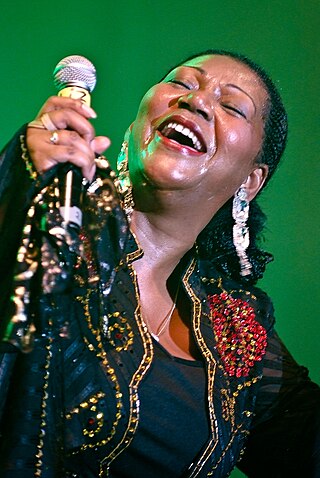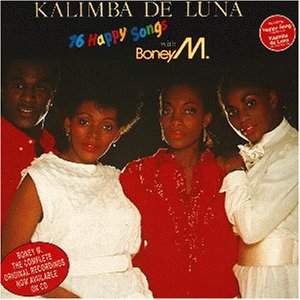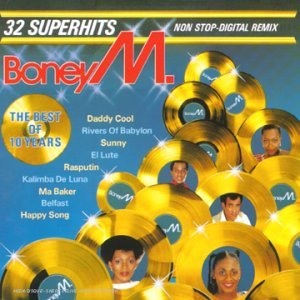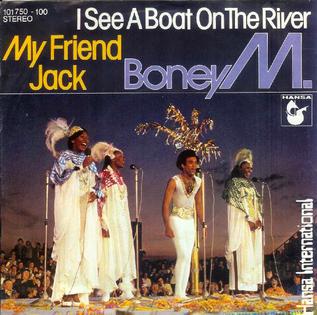
Boney M. are a disco group that specialises in R&B, reggae, disco and funk, created by German record producer Frank Farian, who was the group's primary songwriter. Originally based in West Germany, the four original members of the group's official line-up were Liz Mitchell and Marcia Barrett from Jamaica, Maizie Williams from Montserrat, and Bobby Farrell from Aruba. The group was formed in 1976 and achieved popularity during the disco era of the late 1970s. Since the 1980s, various line-ups of the band have performed with differing personnel.

Elizabeth Rebecca Pemberton-Mitchell is a Jamaican-British singer, best known as one of the original singers of the 1970s disco/reggae band Boney M.

Maizie Ursula Williams is a British model, dancer and singer who became one of the original members of the successful 1970s disco music group Boney M. Though she did not sing on the studio recordings of their songs, she did perform live and subsequently established an independent career as a singer.

"Daddy Cool" is a song produced and co-written by Frank Farian who had founded the group Boney M. to visually perform to his songs on TV and while touring discos. Farian also provided the male voice parts on the record. The song was included on their debut album Take the Heat off Me. It was a 1976 hit and a staple of disco music and became Boney M.'s first hit in the United Kingdom.

Boonoonoonoos is the fifth studio album by Boney M., released in September 1981.

Ten Thousand Lightyears is the seventh studio album by Boney M. and the first to feature new member Reggie Tsiboe, who had taken over Bobby Farrell's role as the band's leading man in early 1982.

Kalimba de Luna – 16 Happy Songs is a compilation album by Boney M. released in late 1984. On the strength of two carbon-copy cover versions, "Kalimba de Luna" and "Happy Song" which gave Boney M. their first Top 20 hits in Germany in three years, this compilation was rush-released in November 1984. Besides the 12" versions of the two singles, the latter marking Bobby Farrell's return to the band but neither featuring Liz Mitchell or Marcia Barrett, the compilation includes 3-minute edits of tracks from albums Boonoonoonoos and Ten Thousand Lightyears as well as non-album singles "Children Of Paradise"/"Gadda Da Vida" (1980), "Felicidad (Margherita)" (1981), "Going Back West" (1982) and "Jambo - Hakuna Matata " (1983), as well as a new remix of "Calendar Song" from the Oceans Of Fantasy album. Just like in the case of 1980 compilation The Magic Of Boney M. - 20 Golden Hits, many of these edits were to re-surface on a number of hits compilations in the future, the latest being 2007 Sony-BMG release Hit Collection.
The "Happy Song" single was originally released under the name 'Boney M. with Bobby Farrell & the School-Rebels' and this compilation as 'Boney M. with Bobby Farrell'.

The Best of 10 Years – 32 Superhits also known as 32 Superhits - Non-Stop Digital Remix is a remix album by Boney M. released in 1986.

More Gold – 20 Super Hits Vol. II is a 1993 greatest hits album by Boney M. Producer Frank Farian issued More Gold - 20 Super Hits Vol. II containing the remainder of Boney M.'s best known songs – again most of them appearing in remixed or overdubbed form but credited as the original versions – as well as four new recordings featuring lead singer Liz Mitchell. Two singles were released from the album in Europe, "Ma Baker Remix '93" and "Papa Chico", the latter credited as "Boney M. featuring Liz Mitchell" and released in early 1994.

The Magic of Boney M. is a greatest hits album of recordings by Boney M. released by Sony BMG in October 2006.

Daddy Cool – Star Collection is a compilation of recordings by Boney M. released by BMG-Ariola's mid-price label Ariola Express in Germany in 1991.

The Complete Collection is a compilation album of recordings by Boney M. released by BMG/CMC Records in Denmark in late 2000.

Christmas with Boney M. a.k.a. (New) Christmas with Boney M. is an aborted second Christmas album turned into a compilation. The album was exclusively released in South Africa where the group's popularity—contrary to the rest of the world—remained high during the early 80s. The album is a sought-after item for Boney M. collectors since it includes the original recording "Mother and Child Reunion" with Reggie Tsiboe and La Mama which was remixed and overdubbed with additional vocals for a 1985 charity single for Ethiopia, released by Frank Farian Corporation. The album has never been released on CD.

"I See a Boat on the River" / "My Friend Jack" is a double A-side single by German band Boney M., taken from their 1980 compilation album The Magic of Boney M. - 20 Golden Hits. "I See a Boat on the River" peaked at #5 in Germany but marked the group's waning popularity in the UK where "My Friend Jack" was promoted as the A-side, faring even worse than their former single "I'm Born Again", stalling at #57. Boney M. would use the double A-side format over the next years, typically with the A1 being the song intended for radio and A2 being more squarely aimed at discos. The sides would usually be switched on the accompanying 12" single.

"Felicidad (Margherita)" is a 1980 single by German band Boney M., not included in any original album by the group. It returned the group to the German Top 10, peaking at #6 but was not released in either the UK or Spain. In the Netherlands, the B-side "Strange" was chosen as the A-side track. "Felicidad" and its B-side "Strange" were included in the 2 x 12" set Boney M. for Dancin' and were added as bonus tracks to the 2007 re-issue of Boney M.'s Boonoonoonoos album.

"We Kill the World " / "Boonoonoonoos"" is a double A-side single by German band Boney M., the second single released from their 5th album Boonoonoonoos. The single was a South-African and Spanish #1 hit and peaked at #12 in Germany. In the UK, it fared better than their previous two singles, peaking at #39. Boney M. would use the double A-side format in this period, typically with the A1 being the song intended for radio and A2 being more squarely aimed at discos. The sides would usually be switched on the accompanying 12" single.

"Somewhere in the World" is a single by disco band Boney M., the only single to be released from their seventh studio album Ten Thousand Lightyears. Featuring the London Philharmonic Orchestra, the ballad marked another commercial low for the band when it peaked at #11 in the Swiss charts and at #49 in Germany. The full length 5:07 version was released on the 12" single.
Lead Vocal: Liz Mitchell. Backing Vocals: Liz Mitchell, Marcia Barrett.

"Young, Free and Single" is a single by German band Boney M., taken from their final album Eye Dance (1985). Only a modest hit, the single peaked at #49 in the German charts. Being a novelty record, the lyrics were about a radio talkshow for dating. Male dancer Bobby Farrell was featured in heavily disguised vocoder vocals in the verses while Reggie Tsiboe did the lead vocals on the chorus. The B-side Blue Beach was an instrumental dub version.
La Mama is a German pop and disco trio who worked in Frank Farian's studios in the first half of the 1980s. Adapting their name from New York theatre La MaMa Experimental Theatre Club, they released three singles and two albums and worked as backing singers on a number of recordings for other artists.

"Malaika" / "Consuela Biaz" is a double A-side single by German band Boney M. and the first single taken from their fifth album Boonoonoonoos (1981). It peaked at #13 in the German charts, their lowest placing so far after their commercial breakthrough. Boney M. would use the double A-side format in this period, typically with the A1 being the song intended for radio and A2 being more squarely aimed at discos. "Consuela Biaz" was first promoted as the A-side in Germany where the group performed it in pop show Musikladen. After a promotional visit to Spain where the group found "Malaika" had become a Top 10 hit, the title was remixed and then promoted as the A-side. It was the second consecutive Boney M. single not to be released in the UK and Japan.



















